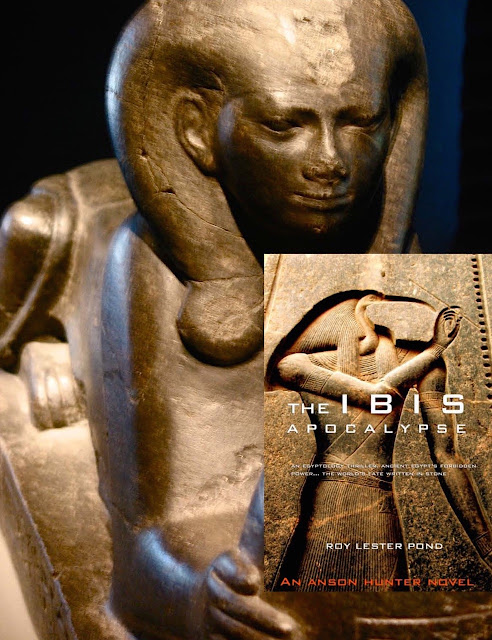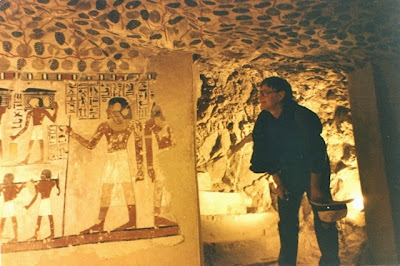 |
| A framed David Roberts painting torn from the wall... |
They
planned to force the door, but they didn’t need to.
“Someone
has beaten us here,” Bloem said.
Anson
hesitated. An image flashed through his mind. He pictured a false doorway from
a tomb. A door that went nowhere. A magical door between two worlds, the living
and the dead. This was such a door, he thought, although this one had a handle
to open and bore a number in brass. His father, or some vestigial remains of
his life, lay behind the door. Would it really admit him into some new
knowledge or understanding of him? Now that his father’s life was over, would
he finally make a contact of sorts? How he longed for that contact and had
longed for it ever since he was a boy.
“You
okay?” Bloem said to him. “Maybe we’d better go first.”
“No.”
He must
cross the threshold.
He reached
out and pushed. The door swung open at a touch.
He
expected to discover the presence of his father inside. Instead he found the
wreckage of his father’s life. The apartment lay in chaos. Books, journals,
papers, photographs, print outs, letters and scraps of papers littered every
surface, scattered over table tops, a green leather topped desk, a trestle
table, even strewn out on the carpeted floor.
They went
inside.
The place
was deserted and a quick check around the studio apartment left him feeling
empty too.
He was
stricken with a childlike loneliness and regret that this ruin was all that was
left of his father.
But there
were personal clues left around that struck Anson like a minor revelation. In
the bathroom, he learnt that his father must have taken a toiletry travel kit
to Egypt on his digs, for here was another set. He saw the brand of toothpaste
his father used and the methodical way he squeezed the tube, rolling it up from
the base, a bright red toothbrush sitting in a glass, an antique metal scrape
shaver, a striped dressing gown hanging behind a door, intimate markers of a
life that his father had denied his knowing. He felt like an intruder seeing
secrets never meant to be seen by others and by him in particular.
Anson felt
a grief come up in his chest for the first time. He fought it down. Stop, he
told himself simply. You’ve got a job to do. But where would he begin?
Torn from
shelves like an avalanche of erudition, lay hundreds of volumes on ancient
Egypt, medieval Egypt, archaeology, mythology and magic, piled in heaps. He
came back to the door.
“Either my
father was not as methodical as his reputation,” he said, “Or this place has
been turned over.”
It looked
as if it had been hit by a howling windstorm. Even pictures had been torn off
the walls. Framed illustrations of Egypt’s ruins by nineteenth century
landscape artist David Roberts lay on the floor.
Anson
looked around the place in wintry bemusement.
“Not
burglars, I’m guessing.”
“They were
searching for information.”
Approaching
the personal effects and papers of the dead Egyptologist’s life was going to be
like approaching an archaeological dig, he thought. Was this how his father had
felt when approaching the excavation of a ruined site?
To go over
this wreckage carefully almost called for the methodology of grid method
excavation, he thought, groaning inwardly. To do it properly wasn’t just a
matter of clearance. Like an archaeologist working on an excavation, he should
probably establish relationships in time between the objects, a relative
chronology and that almost meant calling on the same disciplines of
stratigraphy and superimposition that his father wrote about using in his
diggings. Maybe he should establish a datum point, like the desk where his
father worked. Anson sighed. No time for that. This is my father’s apartment,
not a tomb site.
Yet these
personal books and papers were parts of his father and, like the body of the
god Osiris, who had been ripped into pieces by his enemy, the intruders had
scattered Emory Hunter’s life all over the floor...
























